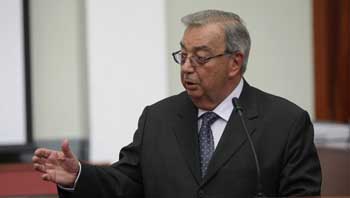‘We Hold the Real Power’
A Jewish Appeal to Russia’s Jewish Elite
Most Russians have suffered terribly during the Yeltsin years. According to Harvard University scholar Graham Allison, who is also a former US assistant Secretary of Defense, ordinary Russians have experienced, on average, a 75 percent plunge in living standards since 1991 – almost twice the decline in Americans’ income during the Great Depression of the 1930s. But in the midst of this widespread economic misery, a small minority has grown fabulously wealthy since the end of the Soviet era.
Although Jews make up no more than three or four percent of Russia’s population, they wield enormous economic and political power in that vast and troubled country. “At least half of the powerful ‘oligarchs’ who control a significant percentage of the economy are Jewish,” the Los Angeles Times has cautiously noted. (See also: D. Michaels, “Capitalism in the New Russia,” May-June 1997 Journal, pp. 21-27.)
Almost certainly the most important of the “oligarchs” is Boris A. Berezovsky, a former mathematics professor who heads the Logovaz financial-industrial group, which includes automobile imports and sales, aviation, oil and media. In 1997 Forbes magazine ranked him as one of the 100 richest people in the world, with an estimated net worth of $3 billion. His extensive media holdings include ORT television, the daily Nezavisimaya Gazeta (“Independent Journal”), and the weekly magazine Ogonek.
The second most powerful business figure is probably Vladimir Gusinsky. In addition to heading the “Most” banking group, he is also called “the Russian Rupert Murdoch” because of his large media empire, which includes the daily newspaper Sevodnya, the weekly news magazine Itogi, and the NTV television network. Gusinsky is also chairman of the Russian Jewish Congress.
Russia’s current prime minister is Yevgeny Primakov, who was promoted from his post as foreign minister in September 1998. During the final phase of the Soviet era, he headed the KGB intelligence and security service, and served as a Politburo member. Early in his career, he dropped the obviously Jewish-sounding name he was born with, Yevgeny Finkelstein.
Many other Jews have played major roles in Russia’s governmental and political life in recent years, among them Alexander Livshitz and Grigory Yavlinsky, presidential chief of staff Anatoly Chubais, deputy prime minister Boris Nemtsov, and prime minister Sergei Kiriyenko.
Recently there has been considerable discussion among Russian intellectuals of a pointed appeal and frank warning to the Jews who now hold decisive power in that sprawling country. It was written by Eduard Topol, a gifted Jewish writer born in the former Soviet Union who now lives in the United States, where he has become a successful author. Among his English-language novels are The Jewish Lover (St. Martin’s Press, 1998), Dermo! (Plume, 1997), Red Square (Quartet Books, 1983), Deadly Games (Quartet Books, 1983), and Submarine U-137 (Quartet Books, 1983).
In his appeal, Topol urges Boris Berezovsky and the other Jewish magnates to forsake their lust for wealth and power, and start to show some concern for the Russian people who have suffered so much at the hands of these pitiless masters.
Here is the complete text of Topol’s extraordinary “Open Letter to Berezovksy, Gusinsky, Smolensky, Khodorkovsky and other Oligarchs,” translated for the Journal by Daniel Michaels from the text published in the respected Moscow paper Argumenty i Fakty (“Arguments and Facts”), No. 38, September 1998:
Bibliographic information about this document: The Journal of Historical Review, vol. 17, no. 6 (November/December 1998), pp. 13-18
Other contributors to this document:
Editor’s comments: n/a

